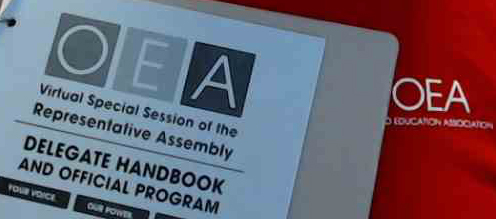On Saturday, along with about 600 fellow delegates, I attended a virtual meeting of the Representative Assembly, the governing body of the Ohio Education Association.
Due to the COVID-19 pandemic emergency, Saturday’s OEA RA was held using an electronic format. Delegates met by telephone, with a managed system handling the speaking order and voting. On a technical level, the system worked well, and OEA’s leadership and staff did a good job of keeping the agenda moving and providing necessary information. If this is how we meet in other emergency situations, we could do worse.
But on reflection, I believe that my fellow delegates and I performed poorly in our task of governing OEA, the state’s largest union. We missed an opportunity to debate amendments to OEA’s Constitution and Bylaws. Delegates will now vote on those by mail, and no one has a clue what we will decide or why–because there was no debate: no one spoke for or against any of the four proposals. Perhaps no one spoke against any of them because no one opposed them. But the duty of making the case for a change belongs to the proponents.
This was particularly troublesome with regard to the first proposed amendment: while the RA handbook provided a “rationale and background” for all four proposals, all it said for proposal 1 was that the proposal was submitted by petition. That’s not a rationale!
I will vote against Proposal 1, but I’ll save the reasons for another post. My focus here is procedural, not substantive.
Seriously, friends, nobody felt they had a responsibility to explain why adding three more caucus representatives to each OEA committee was a good idea? Nobody from the BATs? Nobody from the Rural Caucus? Nobody from the Hispanic Caucus?
As a retired delegate, I believe the active delegates should take the lead on matters of substance, so generally I limit myself to asking questions and clarifying procedural matters. So I don’t regret not speaking against Proposal 1. I do regret not making a motion to separate Proposal 1 into three proposals. At least that would perhaps have forced representatives of these groups to explain why they feel the change is needed.
I should have been quicker. I allowed the virtual meeting to lull me into complacency. Experienced delegates know: if we were physically together on the RA floor, people would have been looking around, elbowing each other, perhaps even carrying on little whispered sidebar conversations. The process would have taken a bit more time as speakers went to the microphones and delegates thought about what they were considering. Instead, it was easy for us to listen passively and let the process unfold without real engagement.
The absence of district RAs also played a role. Generally these issues get looked at in ten district caucuses before we ever arrive in Columbus. But we are educators! We believe in individual responsibility, and the responsibility falls on us! I don’t blame the leadership of OEA or of the ten district associations. The fault is not in our stars, but in ourselves.
Detachment is the enemy of democracy, whether in our society or our union. This was a good dress rehearsal: virtual meetings are a great tool for emergency situations. But when this is how we meet, we, the delegates, need to do better.
Coming up: why Proposal 1 is a bad idea.

